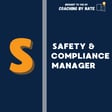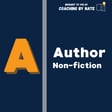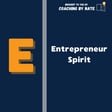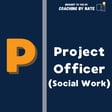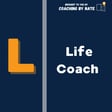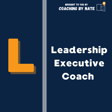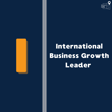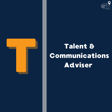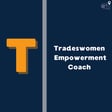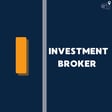Become a Creator today!Start creating today - Share your story with the world!
Start for free
00:00:00
00:00:01

Editor: Behind the Scenes with Bryan, Australian TV Network Editor
Ever wondered what it takes to get the night news to air? In this episode you will meet Bryan, an editor on an Australian TV network. Bryan will share his journey and experience through the film industry, and the importance of self education, steps to build an industry network and how just giving something a go and building you a career!
Transcript
Exploring Professions: History, Requirements, and Rewards
00:00:05
Speaker
Welcome to A to Z Jobs, the podcast that delves into the fascinating world of careers, one profession at a time. In each episode, we'll deep dive into a specific profession, exploring its history, requirements, challenges and rewards. So get ready to expand your horizons, challenge your perceptions and discover a world of possibilities. I'm Roxy. And I'm Nate. And we're excited to host you on this journey.
Brian's Career Journey: Insights into Film Industry
00:00:28
Speaker
Have you ever wondered what it takes to get the nightly news to air? In this episode, you'll meet Brian, an editor of an Australian TV network. Brian will share his journey and experience through the film industry, the importance of self-education, steps to build an industry network and how just giving something a go can build you a career. Hi, Brian. Welcome to our podcast. Thanks, Roxie. Thanks, Nate. Great to be here.
Role and Interaction at ABC's 730
00:00:50
Speaker
Let's jump straight in and find out what you do for a living.
00:00:54
Speaker
Okay, well, what I currently do for a living is I am what's called a CAF program maker.
00:01:01
Speaker
In other words, I'm a video editor and I work at the ABC doing Get Current Affairs, specifically for 730, formerly known as the 730 Report, which is what most people call it. But we have to call it 730 because that's its official name these days. It's funny when you're on a production of the specifics that you've got to stay on. Absolutely. Yeah. Yeah. Got to stay on brand. Yeah.
00:01:28
Speaker
Do you get to work closely in the studio with all the reporters? Or being an editor, are you a bit separate to a lot of the actual? So, well, there's a few different kind of areas, I guess, of production when it comes to the 730 report. So you've got your reporters, you've got producers, they sort of manage the reporters, you've got supervising producers, and you've got the executive producer who oversees the whole show.
Collaboration and Creative Input: Scripted Content
00:01:58
Speaker
So that's sort of on the, I guess the editorial side. And then you've got the crew, which is, you know, camera ops, sound ops and editors. And then you've got the actual studio crew who are the directors, the vision switches who put the show live to air.
00:02:16
Speaker
The editors are most in contact with the reporters and producers. Sometimes the camera guys and sound guys virtually never with the actual studio crew, the directors, because they're in a completely separate studio and we have really nothing to do with them.
00:02:33
Speaker
But most of the time, our day-to-day tasks involve working directly with the reporters and the producers to make sure that we have everything we need as editors and to make sure that
00:02:52
Speaker
I guess sometimes we get asked early on before the actual script is written that the reporters or the producers will come up to ask and ask us for our input. Sometimes they need some help conceiving of ideas like we need to do a recreation or a reenactment.
00:03:14
Speaker
How do we do that and not make it look naff? So they can talk to us, they can talk to the camos.
Creative Editing: Timelines and Challenges
00:03:23
Speaker
We can provide previous examples of work that we've done as individual editors or we've done on the show or from some other completely different show altogether. So yeah, we try to collaborate and try and come up with something new and interesting and compelling. It's really interesting that directors don't get that involved with you.
00:03:44
Speaker
Yeah, the director in this sense is just someone who is queuing up, uh, the vision. They will communicate with the host and say, all right, you're on in five, four, three, two, one, you know, hello, welcome to the program tonight. We've got such and such a story. Um, this report to you comes from, you know, Emily Baker and Ravine Hudson. And then they queue that package and that will go to air.
Balancing Stressful Deadlines and Creative Tasks
00:04:07
Speaker
So they manage that process. So you'd have pretty tight turnarounds, I would imagine then, because you're working on a show that's on nightly. Is there a rhythm to your day? What does a day-to-day task look like for you? There are several different tasks that we do as editors. So we can do packages, which is typically a bunch of interviews strung together with a narration from the reporter.
00:04:36
Speaker
and vision overlaid over the top to make it look interesting or graphics to provide, you
High-Pressure Editing: Legal and Technical Considerations
00:04:43
Speaker
know, stats and figures or, you know, here's a statement from someone who didn't want to be interviewed by us, you know, boom, you know, hooked that up on the screen. So we put those together. We add music to it. We do our own sound mixes and color grades as well. So we have to kind of take care of all of that.
00:05:03
Speaker
So as far as post production goes, we're a bit of a jack of all trades, but kind of a master of none in that sense. So yeah, packages is one thing we'll do. Interviews is something else we'll do. If we are given a package, sometimes we can get, you know, days or weeks to cut those depending on how complex they are or how
A Day in the Life of an Editor: Meeting Deadlines
00:05:28
Speaker
you know, legally kind of fraught, they are, you know, and we're always, sometimes we send an edit to the lawyers to make sure that we don't get sued for one reason or another. So with a package, sometimes here we get days or weeks, other times we'll have to get a package cut in one day. And that can be quite stressful, but if it's,
00:05:57
Speaker
If a package goes for, say, seven, eight minutes, that doesn't stress me out too much these days. When I started, I was just a mess, but these days, if I know that it's that long, and if it's been tightly scripted so that there are minimal changes later on, I can happily go through that at the start of the day, get my vision together, read the script,
00:06:25
Speaker
put out of bed, put the music down and send it out to them at say, you know, say four o'clock in the afternoon. And that way the reporter can look at it, make any changes. The supervising producers can look at it. The executive producer can look at it. And if they're all happy with it, ideally I'll have it sent for the studio director to check, do like a bit of a technical check to make sure the sound levels are okay and the channel mapping is right on the sound.
00:06:53
Speaker
Um, and that'll be done by say seven o'clock and it can go to air at seven 30 and everyone's happy. Um, so yeah, that, that can happen. Um, uh, there was one of the other editors, um, Fred, uh, had to cut a story in one day the other week, not a few months ago, actually.
00:07:17
Speaker
about this woman called Catherine Folbig who got out of prison after 20 years in jail for
00:07:29
Speaker
wrongly being accused of killing her own children. So very dark subject matter. And we knew that she was going to get released at some point or that was very likely. And so the host, Sarah Ferguson, had had written quite an extensive script and interviewed various people.
Adapting to Unexpected Coverage: Catherine Folbig's Case
00:07:48
Speaker
So all the elements were kind of there, but we didn't expect her to get released on this particular day. And that news came out in the morning.
00:07:58
Speaker
and Fred, the editor, came into work at 10 o'clock instead of 11, and he cut that, he cut that and just got it sent, thinking about, finished it, I should say, at about 7.20 maybe. Now I should say that, I said before, you know, seven, eight minutes, that's fine, I can handle that.
Efficient Editing: Time Allocation and Techniques
00:08:25
Speaker
Because generally, to edit one minute of a 7.30 package, you should allocate about one hour, all right? That's how you budget your time. The Casman-Folbig story was 18 minutes, all right? Like Fred is a freak. I don't know how he managed to do that. And I hope the producers don't get any ideas. Just because Fred can do it, all the rest of us can do it.
00:08:55
Speaker
Anyway, that's a lot of pressure to handle in one day. That's at the real extreme end of what a typical day would look like.
00:09:03
Speaker
Um, but otherwise, um, yeah, we can be doing things like, you know, ingesting, um, vision, um, just doing checks and making sure it's all right. Um, we do other things like, like a, like a network tease. We call it a network tease. So it's like a little 20 to 30 second clip that goes on 7 PM news about 15 minutes before the show goes to air so that people can go, Hey, look, that's what's coming up. Stay tuned. Um, and interviews often happen.
Career Transitions and Music Library Management
00:09:34
Speaker
usually kind of late in the day, so maybe four o'clock and onwards. And they can be anywhere between like five minutes or 12 minutes or more. And provided they don't go too far over that time, although they can, then we can quickly cut those and get those ready for the evening's bulletin.
00:10:06
Speaker
Are you feeling inspired by everything you've learned so far? Keep that momentum going with our four-part Career Change Made Easy course. Dive deeper at thecareerchangecoaches.com. Now enjoy the rest of the podcast.
00:10:26
Speaker
movie of some kind took me two days and editing these podcasts. I'm getting quicker but like even eight minutes of talking you know it takes me 20 minutes so it's not. Well you do get you do get um sort of uh I mean you do get a bit of a rhythm down and and you do get a sense of
00:10:46
Speaker
what the decision makers like, like the producers and the EP, you get a sense of what their tastes are like after a while. And I've built up a bank of music and I've put them into different categories, like depressing, slightly uplifting, drone, way too happy, like just all these different kinds of things.
00:11:16
Speaker
If I need them, if I need them quickly, I generally try to find or try to source new music just for my own satisfaction. But, you know, on the same day edit when you need to find something quickly, I've got a few, you know, guaranteed tracks that will work. So you're not only doing all of that, you're also finding your own music. There's no database that's provided for you. No. So, yeah, so there's a bunch of music libraries, like there's
00:11:46
Speaker
There's Extreme Music, there's Beatbox, there's Audio Network, there's Westone. And I use those websites to build up a playlist of tracks that I like, usually using those categories I mentioned before. And if I really get stuck, I'll email them, and they're usually really quick to get back with some options.
00:12:11
Speaker
So that's really helpful because music is probably the most time consuming. I've got like six folders called film music.
00:12:26
Speaker
Yes. And then notes that go with the button. Yeah, yeah. Yeah, no, it's so important. And it can make or break a story. And sometimes, you know, you spend all day editing and you're like, okay, I'm happy with this. It's fantastic. Took, you know, it was a lot of pressure. You know, it's like 10 past seven now, but I reckon they'll like it. And then someone will come along and say, yeah, just not sure about the music and the intro. Have we got any other options there?
00:12:58
Speaker
So yeah, you're always gonna back up options otherwise Yeah, that's the thing. You're not only telling the story but it sounds like you're also Fitting the brief that creative brief and at least four people at a time, you know and and that's hard Yeah, and Yeah, and and I think I think
00:13:22
Speaker
current affairs editing as well in particular is very different from say your typical 7pm news.
Brian's Career Path: Artist to Teacher to Filmmaker
00:13:29
Speaker
How did you get started in all of this? Well how far back do you want to go? Because I've had quite a few. Like I said before I'm currently an editor because I'm just conscious that you know it's probably going to change at some point because my career's kind of gone all over the place. That is the point.
00:13:47
Speaker
And nobody's had a straight line. Yeah. So if you are happy to talk about your journey and the key points into it, not specifically how you got into this, but maybe the, you know, the steps that you got. Yeah. All right. I'll sort of give you the, the elevator pitch version of how I got to where I am. So this is like 20 years of, you know, summing up. Um,
00:14:11
Speaker
But I started life thinking I was gonna be an artist when I got out of high school, right? My dad's an artist, he taught me how to be an artist. So I thought, right, artist. So I went out and I did a diploma of fine arts. Great, love it. But I think I'll become a teacher. So I went out and did an education degree, became a teacher, did that for about seven years, started losing interest, became interested in filmmaking, studied filmmaking at TAFE, told my principal,
00:14:40
Speaker
I want to go part-time as a teacher and pursue a bit of filmmaking on the side. She's like, great. Two years of part-time, two years of bit of freelance filmmaking. My principal says, sorry, we're going to make it redundant. I was like, ouch, okay. I was hoping to kind of keep teaching a little bit longer at least, but
00:15:05
Speaker
But they gave me a very handsome payout. And so along with a bunch of other teachers that were made redundant that year. So I was like, okay, well, great, I'll use this money and put it towards buying myself a little kit of equipment. So I can shoot, I can edit. So I did that and then proceed to freelance for the next few years. I should say this is about 10 years ago now that I
00:15:32
Speaker
got redundant and became a full-time freelancer. So I did that. Next few years freelancing, I thought I want to upskill a little bit more. Do I want to direct or do I want to edit? I thought I'll be able to get into the editing course a lot easier than the directing course. So I just did that at AFTRS. So I did one year of editing, stayed on at AFTRS and did a couple more years of screen business. So I did a master's of screen business.
00:16:02
Speaker
Um, and I should mention that I met someone at the editing course at AFTRS who gave me a contact for the ABC. So I started doing a bit of casual news editing just on the side to supplement my income as a freelancer. Um, and that, all that was working pretty well, you know, um, 2017, 18 and 19, that's what I was doing. 2020 comes along.
00:16:31
Speaker
and things get thrown up in the air a bit. And all my freelance work dried up except for one client and their freelance work increased. So I was actually doing okay, but it was during 2019, 2020 that I started doing a few shifts at 7.30 and midway through 2020, they offered me a full-time job and I was like,
00:17:00
Speaker
And this was at a time when the government was saying, there's a recession about, we're on a cliff right now, we're gonna go into the recession. Sure, I'll gladly take the job of a full-time editor with you. And yeah, it's been quite fascinating and challenging ever since.
Exploring Directing and Creative Networking: Kino
00:17:21
Speaker
That's so interesting. There's so many pivots there. It's amazing. So you mentioned editor for now. Have you got something else on the horizon? Are you already playing in the next step or are you still sort of playing with a few ideas? Well, I mean, everybody wants to be a director, I guess, because everyone has that, you know, control freak in them, I guess, that wants to, you know.
00:17:43
Speaker
um not that I'm a control freak but I would like to make I would like to make sort of good quality uh films short films whatever that might be I I feel like I've heard good ideas you do already I've got lots of ideas um and uh I should mention probably gonna bring it up at some point but I should mention that yeah along though that sort of freelance
00:18:09
Speaker
journey and the ABC alongside all that, I started getting involved in Kino.
00:18:16
Speaker
If you don't know what Kino is, Kino is a monthly open like film night in Sydney. It's been around since 2006. There are chapters all over the world and it's non-competitive. The idea is that you turn up with your film, you screen it in front of an audience and you network. You meet other creative like-minded people. So it's creativity for its own sake and there's no sort of judgment involved in that. It's just a welcoming kind of safe space for creatives.
00:18:46
Speaker
It's a brilliant night out. We get to meet some incredibly interesting people and see some wonderful films and how they develop each time. It's an audience to get that feedback. That's right. And it was through a regular Kinoite that I was able to meet Roxy, actually. So it's a great place to... I really felt like I'd kind of found my tribe, my people at this place.
00:19:15
Speaker
And so that really fueled my sort of creative drive to do interesting work outside of my corporate stuff, the weddings,
00:19:26
Speaker
real estate videos, all the other little things that you do to get by. I mean, it's great just to do all that creative stuff for its own sake, but a lot of what you do in that kind of feeds back into your practice as a professional. So that was really, that was and still is a really positive aspect of that. But yeah, I would like to direct more and I've got some ideas about
00:19:54
Speaker
some films. I'm kind of helping a friend out with a feature film script at the moment. So that would be good. I went to a screening last night for our friend Nick. He's actually on the podcast. Fantastic. That's all coming together. So yeah, Nick screened his short film last night. That was great. That was inspiring. So yeah, I think I would like to try directing a bit more.
00:20:24
Speaker
Definitely. I have like six things for you to do, but yeah. Has Roxy roped you into a slasher film yet? Yes. I've been hearing about this for years. She has, yeah. I mean, I'm ignoring the text, of course, but yeah. No, can't wait, can't wait. Let the blood flow, yeah. We've actually found some locations, so it might actually be happening this year, but we'll see. Fingers crossed.
00:20:54
Speaker
No, that's wonderful. I mean, like the greatest thing about the film industry is there's so many different ways to get involved, you know, from real estate to wedding to, you know, all of that. But it's funny that you also have to have your own project.
Balancing Administration with Creativity
00:21:10
Speaker
So for me, it's very much why I went into the admin roles so that I could do my passion projects outside of work and not have that feeling where I'm constantly hitting a brief. I think for me, that was just something I didn't want to do constantly.
00:21:24
Speaker
Um, but you do crave that creativity and what's next and that next role as well. Cause I was, so I would be a first baby and that would be it. But you know, you actually pushed me into directing a little bit from my, my just one numpty movie. And that was so much fun and, you know, getting stuck in it. Well, Brian's films, he's actually got quite a few, he's been in quite a few festivals, which are awesome. And his short films are so well made. Um, so I think.
00:21:54
Speaker
when you talk quite humbly about your work, but I think it's incredible what you do. Well, thank you. Well, this time I would like to actually put together a bit of a budget, you know, and then kind of...
00:22:07
Speaker
because most of the stuff I've done in the past, I've sort of planned it out. I've had some storyboards, you know, but I think, you know, I would like to actually sort of take it seriously and go, all right, I'm going to put a producer hat on here and like, you know, organize proper catering and have a schedule and, you know, pay the actors, you know, that kind of thing, you know.
00:22:31
Speaker
So, put into action that screen business. I mean, I did a two day course doing something like that. And that was incredible. So, yeah. Well, yeah, that's right. Yeah. Yeah. It has been like for me, I did producing. It's been a while putting my hat back onto what budgets will go where especially in our current economy. I was talking to a grand person this morning and I just flat out asked her like, how much would I put for X, Y and Z?
00:22:59
Speaker
it's just out of the window and she goes you're in the country love you can get that one for free valuable information there yeah yeah yeah um but you do talk a lot about your tribe and I think that's incredibly important every career
00:23:16
Speaker
And Keno, you know, out and networking, you are actually running these events with, you know, Christina and your group of key nights. So, I think, and also going to a course and doing short courses and education and connecting with your ABC person.
00:23:35
Speaker
Um, it's always those key connections that move careers
Opportunities through Personal Connections
00:23:39
Speaker
forward. And I think that's an incredible way to do it. But also, I think you've taken it one step ahead by running a keynote, like taking over keynote and, and doing those monthly events, because I know it was a lot of work pulling together movies every month and, and catering, the catering was always amazing. Yeah, that's all Christina. She does a phenomenal job with food. Yeah, absolutely. Yeah. You feel well looked after. Yeah.
00:24:06
Speaker
Yeah. I will say just on that thing about, yeah, like the connections that you make, like, um, I think like when I was a freelancer about 90, I want to say like 90% of the work that I got.
00:24:21
Speaker
came about through one person. And that person was referred to me just offhandedly by my cousin. And this person just had so much business that they didn't have time to do it themselves.
00:24:38
Speaker
Here's a fashion shoot for industry kids. Can you go and do that? Oh, here's a real estate thing over there. Can you do this one where you have to fly down to Hobart? Yeah, cool. Oh, I've got this one for, yeah, the fashion designer Camille. I'm like, no, I don't know Camilla. I know her now, she's like huge. And yeah, I can't make it. Can you go and do it? It starts in like an hour on a tall ship out in Sydney Harbor. There's gonna be a bunch of, you know,
00:25:05
Speaker
gorgeous models on there. I'm like, OK, sure. All right. So I got up. All from this one person. And also some really sort of long term clients like Omedia. I did a lot of work for Out of Home Media. And they were fantastic to work with. So it's really surprising where sort of the business can come from or where the opportunities can come from.
00:25:34
Speaker
And obviously, you back that up by following through and being able to do a decent job, of course.
00:25:43
Speaker
Um, it's not just about the connections, but it's, yeah, that was one of the most surprising things that I found in the scary world of freelancing is that you don't know where the business is going to come from. Yeah. You almost have to learn on the go as well. Cause every situation is different. You're on a boat. You never look at it, stabilize. If you're turning up an hour before, how do you charge your batteries on it?
00:26:05
Speaker
questions I know of for you. That's the thing like it's it's I guess it's I found out early on that you know you always need empty cards and full batteries you know so at any given time just make sure that those two things boxes are ticked
00:26:22
Speaker
um and that you've got everything packed properly um so yeah if you do have an emergency shoot like on a boat in the harbour then you can just run out and do it so that's awesome so if we get you to put your editor hat back on for a little bit yeah sure so if uh if you had
00:26:42
Speaker
back in your early career decided editing was it, this is what we're going to do. What would it be a faster path for someone to get to a similar role to what you're in now? Before I became a professional in this area, I did kind of just do it on my own. Like I just bought a really cheap camera.
00:27:01
Speaker
I think I got a copy of Sony Vegas, I think it was, which is editing. Great program, actually. I thought it was really good. It was very cheap. So I got a cheap camera, cheap software, and I just kind of tinkered around with it in my spare time. So I got used to it, and I learned
00:27:23
Speaker
how to troubleshoot on my own and just learn how to kind of develop, not a style so much, but just get a sense of the rhythm of editing and the craft of it. And I feel like that
00:27:39
Speaker
that time just allowing myself to play around and explore was so valuable later on when people are suddenly coming at you with deadlines and and and technical problems that get thrown at you like with the million different codex that exist in the world that you know don't always you know
00:27:58
Speaker
play nicely with your computer. I kind of learned about all of that kind of stuff. I used to author my own DVDs as well. I had a great life, a very great social life when I was in my 20s.
00:28:18
Speaker
Yeah, because there were some films that weren't available on DVD, right? So just for my own personal thing, I would put them on, create my own menus, which I ended up using that in my line of work later on as a freelancer, because some people still wanted DVDs in 2010s. You've got to make a wedding
00:28:39
Speaker
intro to go to the different things. Yes, that stuff's really valuable. So I think it's just important just to start making your own work however you can. And like Trucino, find like-minded people as well so you can learn how to
00:29:01
Speaker
You can learn off each other and you can also learn how to communicate ideas in a diplomatic way, I guess, because creative differences can get pretty tense at times and it's important to know how to kind of accept and take on constructive feedback.
00:29:23
Speaker
even if it's not constructive, you've got to sort of translate it into something constructive so that you can, um, so that you can, you can use it. Um, so yeah, um, I'm not sure that really answers the question so much, but I think it does, because in this day and age, there's so much available to you to do that whole process quicker. Um,
00:29:47
Speaker
I did the same thing, but with family videos. So I was like saving my home videos and like trying to edit them. And this is like editing things that my mom had made different colors randomly or fixing things that came out of a container that was dropped in the ocean. So I was fixing water damage on actual tapes and things like that. Those personal projects that you learn so much from and you never actually know
00:30:12
Speaker
that it actually might come in handy in another job. It always does those, you know, understanding the different Kodaks, understanding how to deal with different people, different relationships, how to edit your own crap, because sometimes it is because you're still learning, you know?
00:30:29
Speaker
some of the worst footage I think I've ever edited is my own. So, and you know. Hey man, absolutely. And yeah, look, I think the first like serious attempt I made as an editor and as a shooter for that matter was just filming a mate's box party. And it wasn't anything, you know, lurid or anything. It was just a bunch of dudes, you know, going out doing like doing paintball or something. And then,
00:30:59
Speaker
going to have a few drinks or something, but I brought my camera along and I filmed it all. And then I attempted to edit all of that together. And once again, I put it into a DVD. But yes, it was so, it took so long and I was just shooting aimlessly, really. I just did, I had no idea how to construct a sequence of shots, how to tell a story visually or anything like that. But just by doing it on my own and giving myself the time and the space to explore and play around was invaluable.
00:31:29
Speaker
And I think it also helped when I did go to study film at TAFE and at AFTRS, you know, I was able to come in with questions. You know, I'm not sitting there sort of passively absorbing information. It's that question of film school or no film school. And I actually think it's the mix. If you actually go into film school with a little bit of knowledge, with an apprenticeship or
00:31:56
Speaker
your own personal project or anything under your belt, you ask more specific and more intense questions. It's the same with volunteering before you go into a role that you're interested in. If you go and volunteer and support in a different industry, you learn a bit more about it so that on the day that you start that new job, that six-week training period, it actually goes back down to three because of the constructive questions you're already asking. Yeah. Yeah. Absolutely. And you help your teachers at the same time. Double-learn is the
00:32:28
Speaker
Yeah, absolutely. Yeah. I mean, I've had great experiences when I've studied and also have great experiences just sort of on the job. Like I remember volunteering
00:32:40
Speaker
a wedding videographer like one of the top sort of wedding videographers is I guess I guess at a time when the DSLRs came out and I was like oh wow we can really you know it's uh it's uh we can really make your wedding look like magic it doesn't look like it's shot on a handicam you know and so he just hung out with this amazing videographer for a day he was shooting on a 5D Mark II and he had
00:33:04
Speaker
a belt with, you know, 50mm lens, a 24mm lens, and some 72mm, look at all these lenses. And, you know, you had a
00:33:13
Speaker
a little steadicam and a monopod. And he showed me all of these techniques that I still use to this day. And it was just so informative to understand, I guess, the kind of pace that you have to work at. And also the
00:33:36
Speaker
the level of focus that you have to have. Like you're running around sweating, you know, you're eating Mars bars, just trying to keep your energy levels up. But then when it comes time to shoot, you're just going to kind of send to yourself and go, right, okay, got to make sure it's in focus. The composition is good. And I got to hold the shot for at least 10 seconds. Otherwise the editors doesn't have anything to work with. That kind of extreme
00:34:03
Speaker
that sort of working within those extremes, I found it was quite fascinating. And you're filming something that's so important to someone, and there's all these dramas going on, and you're trying to get the shot, you're trying to get the shot. Yeah. Yeah, it's the stakes. Yeah, I don't know. I don't know if the stakes could be much higher, unless you're working in Hollywood for some big budget. But yeah, you could reshoot that if you want to. Someone's wedding.
00:34:32
Speaker
It's pretty hard to reshoot, although I do know some people have actually reshot vows before because they stuffed up on the day, but very rare, very rare. The technology part is interesting because you talk about your career and how much technology has changed and is there, to keep up to date with that, do you find you have to actively go out and keep up to date or do you find, if you're in a current job and
Staying Updated: Technology in Freelancing
00:34:57
Speaker
there's mechanisms to keep you up to date with technology or you need to actively go out and seek it? So I guess there's two kind of areas of technology that I have to kind of focus on or that I have focused on. One was with my working life as a freelancer. And now with the ABC. But when I was a freelancer, I was a real,
00:35:26
Speaker
gear kind of nerd. I loved trying to find out about the different specs of all the different cameras and all different brands, which cameras handled color in different ways and which cameras you could shoot flat on and how much you could get away with in post. What was the top ISO that you could use before it got noisy? All those intricate kind of details
00:35:51
Speaker
For some reason, I really love learning about that. And so I just read and did all this research about cameras and equipment about 10 years ago. And so I just got instinctively familiar with the technical limitations
00:36:15
Speaker
or the important parameters in any case that you have to keep in mind when you're purchasing a camera or when you're going to hire a camera, for example. After a while, I found that doing all that research just really gives you a bad headache and it gets really annoying. So I kind of backed off, but I find now that
00:36:37
Speaker
If there's a new camera that comes out, I kind of just quickly check its specs and go, all right, that's probably going to handle low light really well. Oh, it's got good stabilization. What kind of amounts it got? I just kind of just quickly check it out and have a pretty good understanding of where it's at because I've done all that research in the past. So I find that it's not too hard to kind of keep up.
00:37:01
Speaker
Um, but I think what's most important as a, as a freelancer anyway, is, is you should have a really good kit of your own that you know how it works. You know, it's limitations really well. Um, so that if you do need to go out and shoot something, then you, you know it really well. I really don't like, um, doing a job, going and hiring a camera that I've never used before.
00:37:31
Speaker
with the expectation that, oh yeah, well, if I understand how to change the aperture, the ISO and the shutter speed and the white balance, and I know what the record button is, then that's it. Cameras have their quirks and you've got to familiarize yourself with that. Otherwise, what can happen is what happened to me a couple of months ago when I did a concert shoot, I had my camera, which is an A73, it's only an A73,
00:37:59
Speaker
And I hired a camera, which was the A7S III, right? And then side by side, the A7S was doing a wide shot of this concert and my A7III was doing a tight shot, roving around. After about an hour, my camera, the A7III was starting to overheat and it was protesting at me saying, you have to stop recording now kind of thing. And I'm like, just hold on for a bit longer, hold on for a bit longer.
00:38:28
Speaker
and you're down. I only keep it cool somehow. I'm not kidding. I was literally blowing it, desperately trying to keep it on. And eventually I just had to, I had to turn it off. It just, it just kept stopping recording. And so I turned it off, take the battery out.
00:38:50
Speaker
blowing it and the battery's hot as I put another battery in there. And so just kind of stumbled over the line. And that was the first act. The second act was another hour. So it was a bit of a nightmare. But the A7S just kept going. No heating at all. Just kept going and going and going. And
00:39:13
Speaker
That was the camera I hired, right? So that was fine. My camera, which I'd never really pushed it like that before. And I'd never, I didn't expect that to happen because it's never happened to me before with other cameras. But, you know, we made it work. I showed everything in 4K. So I was able to punch in with the wide and, you know, kind of. You're a good editor.
00:39:40
Speaker
I fixed it in post. When it comes to the ABC, there isn't really much that changes because if you change the software on one computer, then it has to change it to the whole country, basically.
Workflow Software at ABC: Grass Valley Edias
00:39:58
Speaker
Everything's been standardized for the majority of news programs. Unless you're working on Four Corners or Foreign Correspondent, those ones use like AVID and Premiere Pro. But all the other news programs use a program called Grass Valley Edias. Have either of you heard of Edias? No.
00:40:17
Speaker
No, you haven't heard of it. No one knows what it is except for us editors at the ABC. And I only found this out recently, but when we signed on to get EDS as our program of choice back in 2018, I think, we became EDS's biggest client in the world. So,
00:40:44
Speaker
Um, but yeah, it's basically like a sort of a stripped down version of Premiere Pro. I guess, you know, you're going to say I would be 10.
00:40:58
Speaker
I thought you were going to say iMovie 10. Sometimes I wonder what would be better. But look, EDS is a pretty reliable and solid program. It doesn't have all the bells and whistles that I would necessarily like. But up until a couple of months ago, we had that same program and that same version of that program since 2018. It just had not upgraded.
00:41:25
Speaker
And it was about like a few months ago when we upgraded all of our actual computer workstations, which are now like insanely powerful. Like they've got like 128 gigs of RAM and they've got these gigantic Nvidia cards in them, like more power than I ever thought we would ever need. I'm not complaining. It's just, it's insane. So,
00:41:49
Speaker
But once again, it doesn't actually change much to our workflow. Because that's the way they like to make these changes. They like to make it so that everything just keeps going. Because we've got 24-hour news churning out all the time. We've got shows to put out every night.
00:42:11
Speaker
you know, if something stuffs up, and sometimes it does, then, you know, I mean, I mean, Sydney once a few months back just completely shut down, like nothing could get out.
00:42:26
Speaker
We couldn't put any packages to air. Everything we had to do was live. We could have live presenters or live interviews, but nothing that was actually recorded and cut could go to air. We then had to make arrangements with the other states. We're like, we're going to go up to you and you're going to broadcast from Brisbane or you're going to broadcast from Melbourne. Those days are always interesting.
00:42:55
Speaker
Keeps you in terms. Yeah. That's actually a pretty good segue into our next question.
Cinematic News Editing: Creative Challenges
00:43:01
Speaker
What's your favorite thing about your job?
00:43:05
Speaker
Uh, well, I think I just like the, I guess the sort of the challenge of it, um, in terms of the creative challenge of it. Um, I guess I'm just trying to make sort of day-to-day news, um, you know, look and sound as interesting and kind of cinematic as it possibly can. Um, and, uh, and in these days with, I mean, we're in, we're in competition with
00:43:34
Speaker
every streaming platform on the planet. So we've got to really step up our game. So having that kind of level of expectation is good, I guess, most of the time, provided we can pull it off.
00:43:53
Speaker
Um, and I wouldn't have said this before, but I think I kind of do like the challenge of a same day edit like, um, like I got, I got one the other day. Um, it was a story about Hunter Biden and, uh, how he could bring his, you know, bring Joe down in the election. And, um, but you know, the, um,
00:44:17
Speaker
Barbara Miller, the journalist, had written a really tight script. I mean, she's over there, so she's the correspondent over there. So she'd written it. Everything was shot, done. She'd given us a script, all the vision, and she was asleep because she's on the outside of the world. And it was great. I didn't find out that I was cutting that until it was slightly, like, around about midday, I think. And a lot of the vision hadn't been properly put into the system yet, so
00:44:47
Speaker
I was freaking out a little bit at first because normally everything is there ready to go. So I just had to get all that sort of edit assist kind of work done. And, and, but, you know, by like one o'clock or one 30, I was like, right, everything's there. Got my ducks lined up. Just go for it. And I was quite surprised. I was able to get the edit done in about two or three hours. It was like a six minute package. Um, and.
00:45:17
Speaker
And so I was able to go up to the supervising producers and say, yeah, I'm done. Check it out now if you like. So it was nice to kind of be able to get that done really quickly and to a pretty decent standard, I think. So that's a kind of a good challenge, I think. But I'm trying to engage a bit more with the producers.
00:45:42
Speaker
early on before the shooting is started. And they're trying to liaise with me and us editors a bit more as well. So that's a different muscle that I'm trying to work, which I'm normally used to just
00:46:01
Speaker
Go on with what you got. Fixing problems, you know, fixing a new post, that whole thing, you know, and just kind of sitting there and being grumpy about it. And saying, okay, well, we don't want to do that. So we don't want to give you problems, headaches in the future.
00:46:17
Speaker
What do you think? Okay. All right. That's, that's going to be challenging. So, um, so yeah, so it's, it's, it's a good, it's a good kind of new muscle to try and try and work. And once again, it's, it's a, it's sort of that director hat that I'm trying to work a bit more. So I'm trying to view it that way. Yeah. Trying to think like a director, um, current job and putting in the steps of training for the one that you're aiming for.
00:46:47
Speaker
Yeah, exactly, yeah. Not that I plan on leaving 7.30 anytime soon or anything, but, you know, it's, you know, just have something going on on the side. Yeah, keep learning, keep moving, you know. Yeah, and yeah, trying to stay engaged, I guess, yeah.
00:47:03
Speaker
It must be such a wonderful feeling to... It's the endorphins you get when you finish a project, but you get to finish multiple projects quite a lot and then it's shown to the country. So that's just... Yeah, and I should say that the other thing that is great about working on this show is that they actually tackle
Impactful Stories and Journalism Appreciation
00:47:26
Speaker
you know, like newsworthy issues, you know, they're not necessarily, you know, you know, running around shoving mics in people's faces, you know, and, you know, chasing down dodgy used car salesmen or something. It's, you know, there's some really powerful stories.
00:47:44
Speaker
A few weeks back I did this story about the live export industry and about how years ago there were hidden cameras taken onto ships where they were moving cattle overseas.
00:47:59
Speaker
And the footage of the livestock on these ships was just heartbreaking. There's no air conditioning for these animals. They're just sort of walking all over each other. They're covered in mud and feces and some of them are dying and they're just sitting around there. They're dead sort of companions.
00:48:22
Speaker
All that was fixed, but there's more hidden camera footage of what happens once they reach their destination came out.
00:48:37
Speaker
That was a couple of weeks of sitting with all of this really confronting footage and going over it and having to manually blur it all so that it's consumable on air. But that was a really powerful story. And I think that's something that you don't really get anywhere else. And I think it's really important to get that kind of thing out there.
00:49:07
Speaker
And yeah, I really appreciate being around like some of the top journals in the country, really, like some of the smartest people you're going to meet who are focusing on issues that matter. And, um, it, I think it's, it really helps you, uh, as an editor, like, cause you can take what you're doing seriously. And, um, and I think you can, you can, you can just kind of be more honest with yourself with it and, and, you know, I can,
00:49:37
Speaker
And if you feel something for it, then you can channel that into your work. And if that comes through, then hopefully whoever watches it will be affected by it and understand that, you know, it comes from a place of honesty, I guess that makes sense. Yeah. So that's some of the good aspect of it.
00:49:57
Speaker
Also a very bad aspect of it because you have to watch horrific stuff sometimes. And they do talk about that idea of vicarious trauma that you can get while when you're just being sort of assaulted with these really confronting images over time. You're being hit with the truth that a lot of people kind of avoid with it. Like some people don't watch the news and things like that. You're sitting there looking at it over and over for hours. How do you cope with something like that?
00:50:27
Speaker
Well, I mean, while I was doing the live export story, I'd come home and my girlfriend was having a pretty rough week as well. So I said, we're just going to watch Pixar films at night. That's all we're going to do. Like, do we want to watch like The Walking Dead or something? Nothing horror, nothing at all. I just need to completely zone out. So you do something like that. Go walk the dog, meditate, you know,
00:50:56
Speaker
And if you know, I haven't, I haven't done this myself yet, but the ABC does offer, you know, counseling for this kind of for this specific kind of thing, because, yeah, that, and especially for Jonas, who are overseas, like we've got someone over in Morocco right now, covering the earthquake, and, you know,
00:51:15
Speaker
He's right there in the thick of it. He shot it and edited it himself, actually. So hats off to Tom Joyner for doing that. But yeah, it's a recognized sort of issue that has to be addressed. It's good they do offer that kind of support. It's like train drivers and things that witness things. It's the same thing. You're witnessing real life stories.
00:51:44
Speaker
So in terms of that's obviously a really big negative, is there anything else that you find in this career that isn't to your liking?
Mental Toll of Editing Confronting Stories
00:51:54
Speaker
I think that's probably the worst of it. I think just being subjected to confronting stories and confronting content over and over is quite challenging.
00:52:11
Speaker
It's not like a deal breaker. It's just something that's bad you recognize that you have to do as part of the job. One thing I do miss about being a freelancer is just being out and about and being physically more active as a shooter. And so when you're either sitting or even standing at a desk, it's stuck in one room the whole time.
00:52:41
Speaker
that can be pretty frustrating and bad for your health. So it's very important to go out and get some sunlight otherwise you can't sleep properly at night. But see, just in terms of the physical like sort of health aspect of it, that's something I've actually noticed happen.
00:52:57
Speaker
probably also an age thing but you know being an editor certainly doesn't help that. With editing it's something that you're stuck you kind of feel like okay when I just finish this next little next little next and then the whole day's gone and yeah yeah yeah totally yeah it's um I guess that's that is one
00:53:20
Speaker
good aspect about working on a show like 730 is that you can't really afford to fuss, you know, you've just got to, you've got to be brutal. And yeah, yeah, absolutely ruthless. And, you know, everyone's happy at the end of the day as a result of that. But yeah, I can't really think of anything else that's really that that's really
00:53:55
Speaker
I think to tap into those a lot of people don't and
00:54:01
Speaker
Working in HR, we spend a lot of time choosing these providers to make sure that there's the right amount of support when people need it. I just wish people wouldn't feel so guilty about putting their hand up and just taking advantage. We're paying for this service anyway. Get in there and use it. Even if the only thing you get out of it is a new breathing technique, at least you've got something.
00:54:24
Speaker
Yeah, absolutely. Yeah, I couldn't agree more. And I mean, we've had a few sessions with the psychologist as a team just talking about what vicarious trauma is and we're talking about sleep, how you can get better sleep at night. And so there's various sort of programs that they kind of run to ensure
00:54:54
Speaker
our physical and mental kind of well-being which is always appreciated so yeah take advantage of it yeah yeah definitely so going back into a sort of lighter idea of things what advice would you give somebody who's thinking of entering the editing world and if you if you want to also include the freelance world because we talked a lot about that
00:55:21
Speaker
I guess it goes back to what I said before. I think it's probably best to just kind of start doing it on your own.
Advice for Aspiring Editors: Curiosity and Collaboration
00:55:32
Speaker
Yeah, and sort of learning on your own and being mindful that when you do go to study it, then you've got experience to draw upon when you're asking questions and you're trying to direct your own learning. So I think these days, the technology is so ubiquitous. It's everywhere. So you can pick up your phone. You can start shooting it on your phone. You can edit it on your phone.
00:56:01
Speaker
And even, you know, if you want, if you if you're still using like a Nokia phone you can get like a really cheap SLR or mirrorless camera. And you can just have a go. I think that's, that's probably the most important thing is just to start learning.
00:56:20
Speaker
And like I said before, find like-minded people so that you can work together and build up a portfolio of work. And I think it's really important to be passionate about what you do. So if you find that you actually, you start to, you engage in filmmaking and you think you want to be a director, but actually you find, I don't know, maybe doing sound mixing is more your thing,
00:56:50
Speaker
you know, follow that passion and you'll become an expert at it. And if people, and also you'll develop your own unique style, I think that's important too. Because if you find your passion about something and you become good at it,
00:57:09
Speaker
then you're going to develop your own style and that will make you stand out from the crowd. So I think that's probably vital information. You don't lose, like if you go and do the sound, you're only going to be better at being a camera person because you understand that process. It's an entire puzzle. They all fit in together. They're skills that are completely transferable.
00:57:36
Speaker
And if you can understand what the next part of the pipeline is, you become better at anything. Yeah. Cause it's always, it's a team effort. Um, and, uh, and even if you, yeah. And when you do try and if also, I think it's important to, to try and to, if you, if you can't get paid to do the work you'd like doing, try and do the sorts of work that you like doing as well in your spare time and using that as, as examples of what you can do, because.
00:58:06
Speaker
If you tell people, if you tell people, oh yeah, I can use Photoshop, there's something going to bombard you with Photoshop requests, even if you hate using Photoshop. So it's sort of wise to be careful about what you tell people you can do and try to emphasize what you enjoy doing so that they look at that and go, oh, well, I like that. Can you do more of that, please? So I think that's something I learned the hard way as a teacher.
00:58:36
Speaker
Because as a teacher, I got a sort of a reputation as being somewhat tech savvy as far as digital filmmaking and design work kind of goes. And teachers would often come up to me for technical advice, like IT support sometimes, because they didn't want to go to the IT department.
00:59:04
Speaker
And, uh, you know, that was, you know, that was beyond my pay scale. So I learned after that, you know, you gotta be careful what you say you can do, or just try to emphasize what you want to do and, and try and sort of go towards that. Yeah. You do kind of hear, you learn that the hard way. Like I'm trying to make a horror movie and that's what I'm known for, but man, like more of a sci-fi sci-fi person, if you ever ask me. Okay.
00:59:32
Speaker
I didn't know that about you. We've already heard about a lot of your education and different courses you've done. So I'll leave this question quite open. Is there a particular, is there any particular education you would highly recommend or is there just a book or a blog or just something small that you want to let people know about that you're not very useful? I think yeah, most tertiary education institutions are
01:00:01
Speaker
are great, but I think they're really only as good as what you can kind of get out of them. As I said before, you know, try and go in being curious with your own experiences and questions, and then you'll get a lot more out of it. I think, yeah, I have a slight regret about the Masters of Screen Business course that I did. I think I should have gone in with a clear idea about what I wanted to get out of that.
01:00:29
Speaker
But yeah, man, I mean in terms of education elsewhere,
01:00:33
Speaker
I mean, there's a bajillion podcasts out there that are fantastic. There's, I mean, there's a couple of great screenwriting ones. There's the script writing, the screenwriting life. There's script notes. That's fantastic. I'm listening to this podcast called Team Deacons right now. So that's Roger and James Deacons. And they interview all sorts of people, not just cinematographers. They interview directors, writers, costume designers. They're all fascinating. And I think
01:01:04
Speaker
maybe trying to understand, like we touched on before, trying to understand different roles, different, all the different skill sets that are required to come together to make a film, even if you don't end up, you know, working with all of these different kinds of people, if you're making something really like a zero budget short film of some kind.
01:01:25
Speaker
It's great to know that that is a role, that those skills or that kind of input might be needed. You might need someone to do props or you might need someone to do makeup or you might need someone to be actually good at recording sound. Maybe you should pay that person and just film it yourself because sound is so important.
01:01:49
Speaker
Yeah, I think that's something that's really important, is to understand the different kinds of roles that come together to make a film. There are so many of them now, and there's like even intimacy coordinators. Yeah, totally. And the constant safety side of it, there's so much. But yeah, there's so many great books out there. I mean, there's this one called The Filmmaker's Handbook. I think
01:02:18
Speaker
I can't remember the latest edition, but it came out like a few years ago. It covers sort of everything when it comes to, like it's a few inches thick, but it covers everything from script writing to shooting to post production to sound, very technical, but brilliantly written, like so easy to read. And yeah, I can't recommend that book nearly enough.
01:02:47
Speaker
And I mean, there's a whole there's tapes of other books. I could give you a list if you want and put up elsewhere. Yeah, we do. We're trying to put together show notes for all the podcasts at the moment and trying to also collect a few more resources for the person that signs on to listen to this. Yeah.
01:03:05
Speaker
anything you have, send it across to us. Yeah, but I think there's a lot of great like filmmaking kind of podcasts out there. But yeah, I think
01:03:23
Speaker
Yeah, I think trying to, I mean, it all comes down to storytelling, right? Yeah, so if you can understand storytelling, I think, then everyone's connected that way. That's the blueprint. So if you can understand storytelling, then that will greatly empower you as an editor, I think. Definitely.
01:03:52
Speaker
So our last question is, do you have any quotes that inspire you? Well, I thought about this. I don't really have any like quotes per se, but maybe it is a quote, actually. But I remember
01:04:07
Speaker
Back before I was involved in sort of film and TV production and teaching and all that, while I was still aspiring to be an artist, my dad gave me this book from an art school that he went to. It's a book called Drawing Power, and you can't get it anywhere because it was a book written by the teacher of the Paddington Art School.
01:04:34
Speaker
for his students specifically and it was an incredible book that I still read now. I have a copy of it still here. It's only very short too but it was like brilliantly written and it really
01:04:54
Speaker
it really made sense for me about what the purpose of art is. And it just completely kind of validated and molded and shaped my approach to why I think everybody should be doing art. So I'm a real evangelist when it comes to this. But I remember one thing in that one quote in that that stuck out and that is that
01:05:21
Speaker
that you are more important than any artwork that you could create. So having that kind of attitude means that you don't get precious about your work. You produce it, you make it, and you just kind of look at it as a bit of a work in progress. And if you happen to come out with something that is great,
01:05:48
Speaker
Sure, fine. If it doesn't work, then that's fine. Just discard it. They're just kind of temporal objects. They'll pass, but you are far more important than anything you create. I think that attitude is really important because
01:06:06
Speaker
Making art can be very confronting. It can be deeply personal. Even for something like current affairs news at night, you really can invest a lot of yourself in it. You really try and put your best foot forward. And it's 6.45 at night, and someone comes along, and they're like, yeah, it looks great, but we have to cut it for time. And you spent hours and hours and hours working on this.
01:06:34
Speaker
I just go, look, I'm more important than this. It's a bit of a coping mechanism. So it's like, look, it doesn't matter. It's fine. Just park it on the side. Take it out of this story. But whatever you learn from that, you know, you can put into the next story. You know, it's just a way of it's kind of a coping mechanism, I guess, for how to how to deal with a deal with criticism, I suppose, but also
01:07:00
Speaker
just knowing you know where your values should really lie you know that you are more important and the people around you are more important than whatever they produce you know so that was something that I think it's true to any job you spend so long working in any job and it really is more about you and your family yeah talk to that to that self-care again you know looking after yourself and making sure you're
01:07:25
Speaker
You're at your best. It's going to impact your work as well. Like, you know, if you take it to heart too much, you quickly get over that job. So it does, it does talk to. Yeah. Yeah. And it's, it can be really hard at times when you're sitting there, like as an editor.
01:07:41
Speaker
with people sitting over your, standing over your shoulder, they might not even be looking at what you're doing. They could be on their phone, but if they're standing there, you can feel their presence and you just feel the judgment emanating, you know, even if there isn't any, which is actually a good experience, I think, to do, to
01:08:01
Speaker
to do as an editor is if you haven't if you haven't edited in front of someone else before just get someone else to stand in the room with you and it changes the way you look at what you're cutting it completely changes
01:08:15
Speaker
uh, how you, how you edit, I think. And for the better, I think you become far more, um, uh, yeah, well, we have ruthless, I guess. And, um, your senses are sharpened. So you really, you, you, you, you cut with purpose. Yeah. You don't procrastinate as much. You know, you're like, I know what I'm doing. No. Yeah. Well, that brings us to the end. So thank you very much, Brian. It's been fantastic having you.
01:08:43
Speaker
You're welcome, thanks for having me. It is, thank you. You've been listening to Roxy and Nate. Thanks for tuning into A to Z Jobs and always remember it's your career and it's up to you to shape it. So dream big, make bold moves, stay curious and keep exploring. Check out our website at thecareerchangecoaches.com for more resources, tools and upcoming training.
01:09:10
Speaker
Thank you for joining us on this journey. Don't forget to subscribe and hit that notification bell so you never miss an episode of A to Z Jobs. Remember, your dream career could be just one episode away. Are you feeling inspired by everything you've learned today and ready to take the next step with your career change journey? Dive into our four-part career change made easy course.
01:09:35
Speaker
We'll help you gain career clarity, understand your transferable skills, and put them into play with application, negotiation, and interview advice. Head to careerchangecoaches.com.
